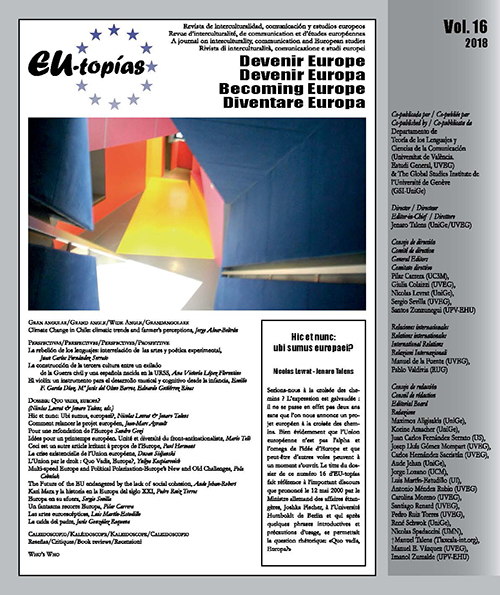The Eurosceptic Arts: A Proposal Regarding the Critical and Aesthetic Acquis of the EU
DOI:
https://doi.org/10.7203/eutopias.0.18372Keywords:
European Union, art, literature, Euroscepticism, critique, crisis, EU acquis Abstract
Abstract
This article discusses the critical and political potential of the artistic cor- pus that engages the issue of European integration. Questioning and re- assessing the European Union (EU) in creative terms is vital for the future of the transnational organization as it struggles to connect with its people. Many works of art of the last few decades can be seen as indexes that point to the root of popular discontent with the EU and offer unexplored answers to current societal challenges. Recent pieces exude a sense of urgency, manifesting deep concern about the European integration project. One could say that they propose a constructive sort of Euroscepticism. In parallel to the existing EU acquis, this article suggests the systematic consideration of the Union’s critical and aesthetic acquis, which should prove to be a useful tool for the improvement of the European project and for fostering the citizenry’s awareness of it through a new legitimizing narrative.
 Downloads
Downloads
 References
References
Enzensberger, Hans Magnus (2012), El gentil monstruo de Bruselas o Europa bajo tutela, trad. Richard Gross, Barcelona: Anagrama.
Gielen, Pascal (2015), “Introduction: There’s a Solution to the Crisis”, en No Culture, No Europe: On the Foundation of Politics, ed. Pascal Gielen, Amsterdam: Valiz. 9-15.
Goytisolo, Juan (2007), “Nuevos ricos, nuevos libres, nuevos europeos”, Obras completas. Vol. 6. Ensayos li- terarios (1967–1999), Barcelona: Galaxia Gutenberg.
Greenblatt, Stephen (1989), “Towards a Poetics of Culture”, en The New Historicism, ed. Harold Veeser, Londres: Routledge. 1 – 14.
Guibernau, Montserrat (2011), “The birth of a united Europe: on why the EU has generated a ‘non-emotio- nal’ identity”, Nations and Nationalism 17(2): 302 – 315.
Innerarity, Daniel (2017), La democracia en Europa. Una filosofía política de la Unión Europea, Barcelona: Galaxia Gutenberg.
Martín-Estudillo, Luis (2018), The Rise of Euroskepticism. Europe and Its Critics in Spanish Culture, Nashville: Vanderbilt University Press.
Mouffe, Chantal (2013), Agonistics: Thinking the World Politically. Londres: Verso.
Müller, Jan-Werner (2011), Contesting Democracy: Politi- cal Ideas in Twentieth-Century Europe, New Haven: Yale University Press.
Nussbaum, Martha (2016), Not For Profit: Why Democracy Needs the Humanities, Princeton y Oxford: Princeton University Press.
Rancière, Jacques, (2004), The Politics of Aesthetics: The Distribution of the Sensible, trad. Gabriel Rockhill, Londres y Nueva York: Continuum.
Sánchez La Chica, Pablo, y Antonio Masip Hidalgo (2012), Europeos pero incorrectos, Madrid: Catarata.
Taggart, Paul, y Aleks Szczerbiak, “The Party Politics of Euroscepticism in EU Member and Candidate States.” SEI Working Paper No.51; Opposing Europe Re- search Network Working Paper No. 6. Brighton: Sussex European Institute, 2002.
Zambrano, María, La agonía de Europa (2000), ed. Jesús Moreno Sanz, Madrid: Trotta
Downloads
Published
How to Cite
-
Abstract273
-
PDF (Español)49
Issue
Section
License
![]()
The authors conserve the copyright. All content published in EU-topías. Journal of interculturality, Communication, and European Studies are subject to the license Creative Commons Attribution-NonCommercial-ShareAlike 4.0 license. The full text of the license can be found at <http://creativecommons.org/licenses/by-nc-sa/4.0>
They may be copied, used, disseminated, transmitted and publicly displayed, provided that:
- The authorship and original source of the publication is cited (journal, publisher and URL of the work).
- They are not used for commercial purposes.
- The existence and specifications of this license of use are mentioned.
It is the responsibility of the authors to obtain the necessary permissions for images that are subject to copyright.



